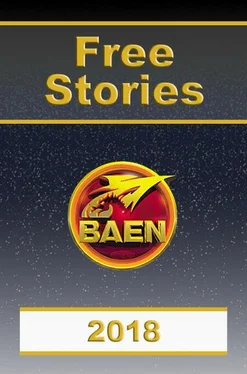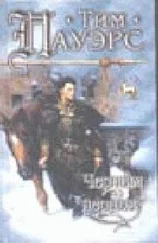Maybe he’d been wrong. Maybe the boat hadn’t collapsed in on itself because something in the deeps had taken them out of their time, out of their space, and brought them here. Maybe it was the pressure itself that flattened them into a mote upon the wings of time and carried them through dimensional channels yet unimagined all the way to Lake Superior. Maybe there were sub-oceanic ducts beneath all of the world’s great waters. Stranger things were attested in the science of this modern age, or if not stranger, at least very strange.
“Do I announce your decision, Herr Kahloin?” Goon asked. This was serious. It called for formal language. “Have you made one, and when do we leave?”
Lachs seemed to consider this question. Suddenly, however, Goond found himself with no time to wait upon the commander’s word. “Yes, I understand,” Goond said. “Meeting of officers, then all-crew muster. I’ll just go right away to get that organized. Immediately yes? I’d better get started—”
Because he saw something that Lachs had not yet spotted, lost in thought as Lachs was and staring at the lake. Goond was not staring at the lake. Out of the corner of his eye he could see the house up-slope at the head of the resort with its cabins and its little restaurant, where the store and the office was. The house where the old man lived, though the old man had gone on a drive today, to run some errands. The house where the old man lived with the older woman, about whom Lachs had said nothing at all, whom none of them had seen but at a distance.
There was a woman coming now. She was thin like the branches of a hawthorn tree well adorned with its wicked sharp slender thorns. She was wearing the sort of a dress that might be worn by any respectable European woman within living memory, to judge from the TV, something long and patterned blue and white, and she was striding with purpose and determination across the long lawn between the big house and the cabin at whose railing Goond stood with Lachs.
Goond did not want any part of it, but she called out, her voice startling Lachs into the sort of whiplash-spin that was almost never good for a man’s balance. “You too, Goond,” she called, clear and strong. “The both of you. I will have words. No time to spare.” In German. And, oh, Goond recognized that determination in her voice. He hadn’t wanted to.
Lachs had gone as green-white in the face as ever he’d been at the end of a long cruise, apparently stunned into paralysis. The woman climbed the two low steps up onto the porch. There was something in her hand. “You are not the only U-boat that has found itself in strange waters,” she said, holding the something out—papers, papers with notes. “There is traffic. Goond. You look well. Has my husband been eating his breakfast?”
She’d gotten old. Well, of course she had, “Charlie” was an old man, older even than he looked to Goond; and Emrys had been only two years younger than Fergie when they’d married. She was wearing her hair short, in iron-gray curls; without make-up her features were sterner than Goond remembered, but she had always had that hint of unfathomed strength in her eyes.
Fergie had turned away and put his hand to his forehead. The look Emrys gave his hunched shoulder blades was one of infinite compassion; Goond felt uncomfortably like he was peering through someone’s bedroom window. “He is my commander,” Goond said. “And nobody tells him to eat his breakfast. Except you. How did you know he was him?”
A foolish question, really, and Goond wished he could call it back. “You and Charlie quarrelling in the store-front, when you came,” she said, to Fergie’s turned back. “Do you think I would ever forget your voice? My love. —But Charlie is not the only ham radio operator in our family. There has been an incident near Rio de Janeiro in Brazil that should concern you, because we may be the only people with any idea of what might be happening, and what could happen if something is not done.”
Goond scanned the papers she’d given him. Notes. A cruise ship, yes, he’d seen ads for cruise ships on TV and then he’d had to look them up on the computer and study them in sick fascination. There were three times as many people on some of those ships than had been lost when the Bismarck had gone down. The news Emrys brought said that there had been very few casualties; these things were built with phenomenal redundancies in their survival gear, and besides the ship had stayed afloat. That was a very great blessing: but it also wasn’t the point.
There were the official reports, and then there were the fringe elements. Some of its passengers insisted that someone had tried to sink them. There was gossip about torpedoes, a periscope, the conning tower and bridge of submarine. Someone claimed that someone had a photo, howsoever blurry, and was holding out for a fat enough offer from a tabloid magazine.
Someone had seen a cartoon on the conning tower of the supposed submarine that someone was supposed to have seen. According to Emrys’ notes the media discounted any such sightings, but gossip spoke of a big white fish. Moby Dick. The White Whale.
Which to anybody who knew anything pointed exclusively and immediately to U-797 Dietsch. Goond knew that ship, or at least he knew U-797 Dietsch. VII-F. A monsoon boat, one of possibly only four VII-Fs as far as Goond knew, tasked with bringing fresh torpedoes into the Indian Ocean; so they’d rounded the Cape of Good Hope: and could have seen the Dutchman.
This changed things. Over the past few days he’d realized, he thought they’d all truly realized, that the war was over. It would take a certain amount of willful blindness to look at one of those huge floating hotels and see a troop transport, even off Allied Rio de Janeiro. There hadn’t been a threat to commercial shipping since 1945, and a cruise ship had no conceivable protections. But Raimond Dietsch had never been quite right in the head.
“I’ll go speak to our officers,” Goond said. It was more than something that had to be put into motion right now. It was also a good exit line. Raimond Dietsch meant trouble. Someone needed to reach out to him, somehow, and put him straight.
Goond left Emrys Lachs to say what she had to say to her husband—her husband, to say to her—and went forth with concentration on the emergency that would impel them to their grand experiment sooner, rather than later.
* * *
By the time Charlie got back from his errands it was past dark. He came in through the back of the house, as he always did; that meant the kitchen door. So comfortably familiar was the sight of his mother sitting at the kitchen table with her old-fashioned drip coffee pot sitting on a trivet in the middle that he didn’t think twice about her being there, and started talking as he turned to secure the screen door behind him. He hadn’t taken it down for the winter, and it was too late now, because summer would be here soon.
“Sorry I’m late,” he said. “Bad traffic on the road past Benson. Need to put a light on some of those cross-streets, and soon.” He heard the clink of her mug against her saucer. Always a saucer, even with a mug. And always picking up her mug, taking a sip, and setting it back down again, even when it was only to pick it up again for a second sip immediately.
There was another chime of mug against saucer, and Charlie realized that she wasn’t alone.
He turned around. That man. He sat beside Charlie’s mother, not across from her, the chair drawn around to sit at the diagonal so that he’d been partially screened from view. He wasn’t looking at Charlie. He was wearing the jacket he’d had on the first time Charlie had seen him, and there was a pile of cabin-keys in front of him on the table.
Читать дальше








![Тим Пауэрс - Последние дни. Том 2 [litres]](/books/393813/tim-pauers-poslednie-dni-tom-2-litres-thumb.webp)
![Тим Пауэрс - Последние дни. Том 1 [litres]](/books/394090/tim-pauers-poslednie-dni-tom-1-litres-thumb.webp)
![Тим Пауэрс - Последний выдох [litres]](/books/402145/tim-pauers-poslednij-vydoh-litres-thumb.webp)